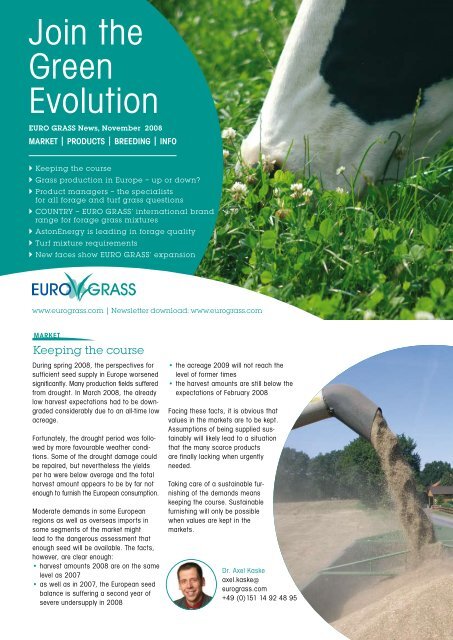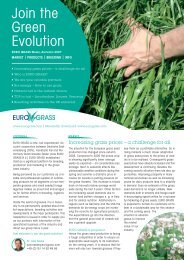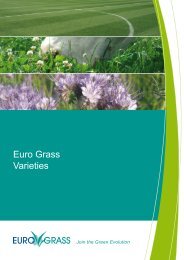Join the Green Evolution
Join the Green Evolution
Join the Green Evolution
Create successful ePaper yourself
Turn your PDF publications into a flip-book with our unique Google optimized e-Paper software.
<strong>Join</strong> <strong>the</strong><br />
<strong>Green</strong><br />
<strong>Evolution</strong><br />
Euro Grass News, November 2008<br />
Market | Products | Breeding | info<br />
} Keeping <strong>the</strong> course<br />
} Grass production in Europe – up or down?<br />
} Product managers – <strong>the</strong> specialists<br />
for all forage and turf grass questions<br />
} COUNTRY – EURO GRass’ international brand<br />
range for forage grass mixtures<br />
} astonEnergy is leading in forage quality<br />
} Turf mixture requirements<br />
} New faces show EURO GRass’ expansion<br />
www.eurograss.com | Newsletter download: www.eurograss.com<br />
Market<br />
Keeping <strong>the</strong> course<br />
During spring 2008, <strong>the</strong> perspectives for<br />
sufficient seed supply in Europe worsened<br />
significantly. Many production fields suffered<br />
from drought. In March 2008, <strong>the</strong> already<br />
low harvest expectations had to be downgraded<br />
considerably due to an all-time low<br />
acreage.<br />
Fortunately, <strong>the</strong> drought period was followed<br />
by more favourable wea<strong>the</strong>r conditions.<br />
Some of <strong>the</strong> drought damage could<br />
be repaired, but never<strong>the</strong>less <strong>the</strong> yields<br />
per ha were below average and <strong>the</strong> total<br />
harvest amount appears to be by far not<br />
enough to furnish <strong>the</strong> European consumption.<br />
Moderate demands in some European<br />
regions as well as overseas imports in<br />
some segments of <strong>the</strong> market might<br />
lead to <strong>the</strong> dangerous assessment that<br />
enough seed will be available. The facts,<br />
however, are clear enough:<br />
• harvest amounts 2008 are on <strong>the</strong> same<br />
level as 2007<br />
• as well as in 2007, <strong>the</strong> European seed<br />
balance is suffering a second year of<br />
severe undersupply in 2008<br />
• <strong>the</strong> acreage 2009 will not reach <strong>the</strong><br />
level of former times<br />
• <strong>the</strong> harvest amounts are still below <strong>the</strong><br />
expectations of February 2008<br />
Facing <strong>the</strong>se facts, it is obvious that<br />
values in <strong>the</strong> markets are to be kept.<br />
Assumptions of being supplied sustainably<br />
will likely lead to a situation<br />
that <strong>the</strong> many scarce products<br />
are finally lacking when urgently<br />
needed.<br />
Taking care of a sustainable furnishing<br />
of <strong>the</strong> demands means<br />
keeping <strong>the</strong> course. Sustainable<br />
furnishing will only be possible<br />
when values are kept in <strong>the</strong><br />
markets.<br />
Dr. Axel Kaske<br />
axel.kaske@<br />
eurograss.com<br />
+49 (0)151 14 92 48 95
info<br />
Grass production in Europe – up or down?<br />
The contracting of grass and clover seeds<br />
has been very difficult <strong>the</strong> last two years.<br />
And it will continue <strong>the</strong> next year as well.<br />
Many former seed producers have changed<br />
<strong>the</strong> production into cereals or canola. There<br />
were two main reasons for this change in<br />
production. For most arable farmers <strong>the</strong> increasing<br />
prices of cereals meant that <strong>the</strong>y<br />
increased <strong>the</strong> cereals production because<br />
it was more profitable and a lot easier than<br />
seed production. And <strong>the</strong>y were right, because<br />
<strong>the</strong> profit from crop 2007 was better<br />
in cereals than in seed production.<br />
The o<strong>the</strong>r reason for <strong>the</strong> change into cereals<br />
is caused by <strong>the</strong> pig breeders. They increased<br />
<strong>the</strong> production as much as possible to be<br />
self supplied with fodder. It was a right decision<br />
on farm level because <strong>the</strong> economic<br />
info<br />
Product managers –<br />
<strong>the</strong> specialists for all forage and turf grass questions<br />
If you have questions about varieties, marketing of EURO<br />
GRASS products or about forage or turf grasses in general<br />
please ask our product managers. They are <strong>the</strong> interface<br />
between breeding, production and sales in EURO GRASS.<br />
Due to <strong>the</strong>ir close contacts to <strong>the</strong> breeders <strong>the</strong>y are able<br />
to push up new varieties or interesting topics very fast.<br />
They support <strong>the</strong> area managers in all kind of marketing<br />
purposes to fulfil customer’s needs. So whenever you have<br />
more detailed questions about EURO GRASS products,<br />
please contact our specialists.<br />
Product manager forage crops international<br />
Marion Noelkensmeier<br />
marion.noelkensmeier@eurograss.com<br />
+49 (0) 29 41 29 63 69<br />
Product manager turf grass international<br />
Bjarne Frølund<br />
bjarne.frolund@eurograss.com<br />
+49 (0) 29 41 29 64 98<br />
matter of <strong>the</strong> pig production is more important<br />
than <strong>the</strong> arable farming on <strong>the</strong> farm.<br />
These are <strong>the</strong> two most important reasons<br />
why <strong>the</strong> production of grass and clover in<br />
2007 and 2008 was lower than normal.<br />
The seed yield per hectare was also lower<br />
than normal in both 2007 and 2008. It<br />
means that <strong>the</strong> production in Europe was<br />
about 25 % lower than normal in both<br />
2007 and 2008.<br />
The estimated acreage for crop 2009 seems<br />
to be on <strong>the</strong> same low level as in 2007 and<br />
2008.<br />
Also for harvest 2010 <strong>the</strong>re will be problems<br />
with contracting <strong>the</strong> grass and clover seeds<br />
because most of <strong>the</strong> European farmers have<br />
For <strong>the</strong> EURO GRass homemarkets in Germany, <strong>the</strong> Ne<strong>the</strong>rlands<br />
and Denmark are responsible:<br />
Germany<br />
Forage crops<br />
Frank Trockels<br />
frank.trockels@eurograss.com<br />
+49 (0) 29 41 29 62 47<br />
Marion Noelkensmeier<br />
marion.noelkensmeier@eurograss.com<br />
+ 49 (0) 29 41 29 63 69<br />
Turf grasses<br />
Bjarne Frølund<br />
bjarne.frolund@eurograss.com<br />
+49 (0) 29 41 29 64 98<br />
The Ne<strong>the</strong>rlands<br />
Forage crops und Turf grasses<br />
Rene Verhoeven<br />
rene.verhoeven@eurograss.com<br />
+31 (0) 4 85 55 06 19<br />
been sowing more<br />
winter cereals than normal.<br />
It means that <strong>the</strong> acreage for grass and<br />
clover seeds will be limited <strong>the</strong> next two<br />
years.<br />
Denmark<br />
Carsten Jørgensen<br />
chj@hunsballe.dk<br />
+45 97 42 05 33<br />
Forage crops<br />
Betty Schmidt<br />
bsc@hunsballe.dk<br />
+45 96 10 83 20<br />
Turf grasses<br />
Winnie W. Olsen<br />
wwo@hunsballe.dk<br />
+45 40 45 97 04<br />
Products<br />
COUNTRY – EURO GRass’ international brand<br />
range for forage grass mixtures<br />
Founded 1994 as a high quality programme<br />
for forage grass mixtures in Germany,<br />
COUNTRY will now conquer <strong>the</strong> international<br />
market for EURO GRASS. The high<br />
quality programme COUNTRY offers mixtures<br />
which are adapted to different kind<br />
of grassland use and different climatic<br />
conditions. All varieties used are at <strong>the</strong><br />
top of international recommendation. Based<br />
on this ‘grassland philosophy’ COUNTRY<br />
became <strong>the</strong> biggest brand range programme<br />
for forage grass mixtures in Germany.<br />
It consists of mixtures for extensive<br />
to very intensive grassland use, ley<br />
farming, horse meadows and ecological<br />
grassland farming. For several years this<br />
Breeding<br />
astonEnergy is leading in forage quality<br />
There is no better perennial ryegrass in forage<br />
quality than AstonEnergy. These are<br />
<strong>the</strong> conclusions of <strong>the</strong> latest recommendations<br />
for perennial ryegrass in England<br />
and Wales. In contrast to most of <strong>the</strong> o<strong>the</strong>r<br />
European countries forage quality is a very<br />
important parameter in <strong>the</strong> official variety<br />
testing in England and Wales.<br />
In 2008 AstonEnergy (intermediate, tetraploid)<br />
is <strong>the</strong> variety with <strong>the</strong> highest diges-<br />
COUNTRY strategy works quite well in Poland<br />
too, <strong>the</strong>refore last year EURO GRASS<br />
decided to put COUNTRY on an international<br />
level. COUNTRY was established in <strong>the</strong><br />
Baltic States for sowing in autumn 2008,<br />
o<strong>the</strong>r countries are in preparation.<br />
Look at www.eurograss.com, www.dsvsaaten.de<br />
or www.dsv-polska.pl for more<br />
details.<br />
Marion Noelkensmeier<br />
marion.noelkensmeier@<br />
eurograss.com<br />
+49 (0) 29 41 29 63 69<br />
tibility on <strong>the</strong> list (D-value in mid summer<br />
under simulated grazing = 10.5, D-value<br />
at second silage cut = 9.8). Within <strong>the</strong><br />
intermediate tetraploid group Aston Energy<br />
is 1 D-value unit better than <strong>the</strong> next best<br />
variety under simulated grazing and 2.7<br />
units better than <strong>the</strong> average of all o<strong>the</strong>r<br />
varieties. Under <strong>the</strong> silage management<br />
Aston Energy is 1.4 D-value unit better than<br />
<strong>the</strong> next best variety under simulated grazing<br />
and 3 units better than <strong>the</strong> average<br />
of all o<strong>the</strong>r varieties.<br />
What does this mean for <strong>the</strong> farmers? In<br />
situations where enough grass is available<br />
to satisfy animals increased appetite,<br />
improved digestibility has a very large<br />
effect on animal output and a one point<br />
increase in D-value can increase animal<br />
output by five percent!<br />
Tim Ball<br />
tim.ball@eurograss.com<br />
+44 (0) 12 95 75 88 00
info<br />
Turf mixture requirements<br />
In Europe approximately 10 important grass<br />
species are used for turf purposes. Lolium<br />
perenne, Festuca rubra, Poa pratensis and<br />
Festuca arundinacea are good examples<br />
of <strong>the</strong> most important species.<br />
Grass is not just grass. This statement<br />
applies especially for turf grasses. The different<br />
species have different characteristics<br />
and within <strong>the</strong> species <strong>the</strong>re will be<br />
several varieties which also have different<br />
characteristics.<br />
Some important subjects to take into consideration<br />
when compiling mixtures:<br />
• Wea<strong>the</strong>r conditions (summer and winter<br />
temperature, rainfall, snowfall etc.)<br />
• Local conditions (shade, sun, irrigation, etc.)<br />
• Soil conditions (soil texture, heavy or light)<br />
• Purpose of use (degree of wear,<br />
ornamental or sports use – or “just”<br />
landscaping)<br />
Euro Grass B.V., Germany<br />
International sales Department<br />
Weissenburger Straße 5<br />
59557 Lippstadt<br />
• Nursing and maintenance: How big an<br />
effort is <strong>the</strong> customer willing to make?<br />
So <strong>the</strong> first reason for making mixtures is<br />
we want to use <strong>the</strong> right species and varieties<br />
– and in <strong>the</strong> right proportion – for<br />
each individual purpose.<br />
Synergism is ano<strong>the</strong>r reason for making<br />
mixtures. It is a fact that well composed<br />
mixtures with many ingredients will stand<br />
pests, diseases, invasion from weeds etc.<br />
better than a straight sown variety or a<br />
“narrow” mixture.<br />
EURO GRASS has got <strong>the</strong> experience in<br />
turf grasses and our breeders have bred<br />
excellent varieties so we today can make<br />
top quality mixtures for all purposes.<br />
info<br />
Phone +49 (0)2941 29 60<br />
Fax +49 (0)2941 29 61 00<br />
Bjarne Frølund<br />
bjarne.frolund@eurograss.com<br />
+ 49 (0) 29 41 29 64 98<br />
New faces show EURO GRass’ expansion<br />
Operational director of EURO GRASS B.V. (NL)<br />
Since 28th April 2008 Helmig Spijkerboer is<br />
<strong>the</strong> new operational director of EURO GRASS<br />
B.V. in <strong>the</strong> Ne<strong>the</strong>rlands. Toge<strong>the</strong>r with Dr. Axel<br />
Kaske, managing director of EURO GRASS<br />
B.V. and successor of <strong>the</strong> retired Frans Plevier,<br />
he will run <strong>the</strong> management of <strong>the</strong> daily business<br />
at Ven-Zelderheide. In addition he will be<br />
responsible for inventing and coordinating<br />
projects for <strong>the</strong> entire EURO GRASS group.<br />
Dr. Axel Kaske will continue his work mainly<br />
from <strong>the</strong> office in Lippstadt due to his responsibilities<br />
in international marketing of<br />
grass seeds.<br />
Helmig Spijkerboer<br />
helmig.spijkerboer@<br />
eurograss.com<br />
+31(0) 485 55 06 12<br />
www.eurograss.com<br />
info@eurograss.com<br />
Product manager turf grass for Hunsballe (DK)<br />
Winnie Olsen works as new product manager<br />
for turf grasses in charge of sales<br />
and marketing of turf grasses for Hunsballe<br />
in Denmark, starting 1st June 2008.<br />
Winnie has previously worked for Brenntag<br />
Nordic with fertilisers for horticultural<br />
crops in <strong>the</strong> Nordic countries. Before that<br />
she worked as a plant consultant for <strong>the</strong><br />
Danish Grower Association primarily with<br />
plant protection products for horticultural<br />
crops. Winnie has a master degree in<br />
horticulture from <strong>the</strong> Royal Veterinary and<br />
Agricultural University in Copenhagen.<br />
Winnie W. Olsen<br />
wwo@hunsballe.dk<br />
+45 40 45 97 04<br />
www.plantamedium.de





